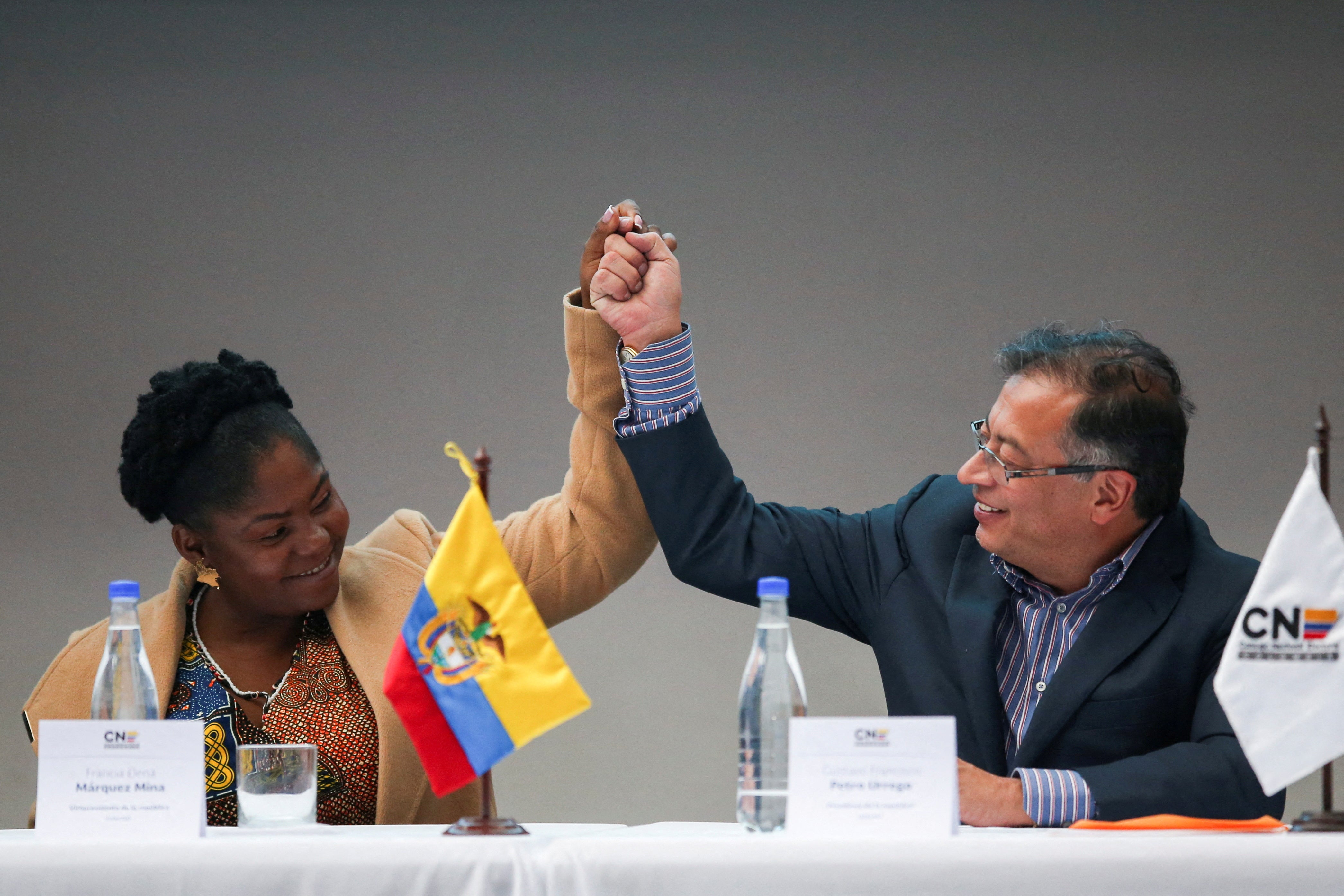For the first time in history, a left-wing government has won in Colombia. Now comes the hard part
Gustavo Petro’s election is already prompting fear among the country’s oligarchs and entrenched elites, writes Borzou Daragahi


It was an unprecedented moment, but the challenges and hurdles ahead will be of even greater enormity. Colombia, one of Latin America’s most culturally, militarily and politically important nations, elected for the first time in its history not only a left-wing president, but a vice-president hailing from the country’s long-marginalised African-Colombian community.
President-elect Gustavo Petro, a former leftist guerilla fighter turned politician, and his running mate Francia Marquez, a prominent environmental activist and lawyer who once worked as a maid, were triumphant after the vote.
“We have to build a democracy in Colombia, and we will build it by enabling a pluralism of consciousnesses, ideologies and colours,” the 62-year-old Petro said in his speech after the 19 June victory.
The election is part of a “pink wave” across Latin America, with leftists and centre-left governments taking control in Mexico, Bolivia, Argentina, Chile, Honduras and Peru, and poised to win in Brazil.
But as recent anti-government protests in Buenos Aires, nationwide strikes in Bolivia, and unrest elsewhere show, electing left-wing leaders at the ballot box is not nearly enough to resolve Latin America’s economic troubles. Indeed, raising people’s expectations in an election campaign only to fail to deliver substantive policy changes could spark even more destabilising fervour.
Colombia’s election drew the highest turnout for a vote in nearly 30 years. The leftists’ victory came on the strength of votes from the country’s impoverished peripheries, along the coastline and in border regions, as well as the city of Bogota, where Petro had served as mayor. The ticket’s strongest support came from places like Choco province, much of which is inhospitable jungle terrain, with a poor and long-neglected African-Colombian population that makes up more than 80 per cent of its inhabitants.
In his victory speech, Petro promised a redistribution of wealth, economic pluralism, and a measure of social justice. “We are going to develop capitalism in Colombia, not because we love it, but because we have to go beyond pre-modernity in Colombia, feudalism in Colombia, and new forms of slavery in Colombia,” he said.
Petro’s proposals include collecting taxes from businesses and industries, salvaging the environment, and free higher education. He has also vowed to confront the power of the armed forces, arguing that security personnel accused of human rights violations should be tried in regular courts instead of by their military peers.
Petro only won a slight majority, but his election is already prompting an alarmist outcry among the country’s oligarchs and entrenched elites, including powerful right-wing members of the army and the security forces who rallied around Trumpian right-wing populist and developer Rodolfo Hernandez in the second round of the presidential vote.
Petro’s loyalists do not control a majority in parliament, though he managed to form a parliamentary alliance with the Liberal Party on 22 June that should help him to pass laws. More than a shift to the left, the election may have signalled a collapse of the party system that has dominated the country for decades.
“There are real apprehensions about his background and his intentions,” says Christopher Sabatini, a Latin America expert at Chatham House. “Leaving aside the alarmist worries, even his more modest proposals will trigger exaggerated responses and opposition.”
Of all the leftist leaders now in control of Latin American governments, Petro may be the weakest and face the most formidable challenges. Colombia is fundamentally a conservative country, and will not tolerate radical change. Public demands such as tax collection, management of resources, and free education require technocratic knowhow rather than political skill. His ideas have already made investors skittish.
“These are not battles that you win on the street,” says Sabatini. “And the truth is that when Petro was mayor of Bogota, he wasn’t a great manager.”
Colombia is also facing challenges unique to Latin America. It shares a 1,378-mile border with Venezuela, the most troubled nation in South America, and hosts up to 2 million refugees from the country. Cross-border rebel groups threaten the country’s security. Petro advocates a policy of critical engagement with the Caracas government of Nicolas Maduro, adopting a line similar to that held by centre-left parties in Europe.
Though it may no longer be at the centre of the world’s cocaine industry, Colombia’s drug wars persist, and drug money pours into the country, feeding corruption. One of Petro’s most controversial proposals is to legalise marijuana.
To keep up to speed with all the latest opinions and comment, sign up to our free weekly Voices Dispatches newsletter by clicking here
But managing Washington may be Petro’s biggest challenge. Though US president Joe Biden’s administration has congratulated Petro on his victory, right-wing US politicians are sounding the alarm. Florida governor Ron DeSantis described him as “a former narco-terrorist Marxist”. Florida senator Rick Scott called him an “extreme left-wing socialist”.
Colombia is a major US military partner as well as being the Latin American nation closest to Israel, and Petro’s rise risks becoming mired in Washington politics. Right-wing Colombians are already inserting themselves into the machinery of influence-peddling and lobbying that pollutes American foreign policy. “It will become an issue in the US,” says Sabatini. “It could become a deeply polarising matter.”
Managing all of this will require a deft political touch as well as stellar management skills. Petro, trained as an economist and not known for his oratory proficiency, will also have to temper raised expectations.
There is a danger that Petro and Marquez could curtail their ambitions to retain power, making them just colourful window-dressing on the hard machinery of exploitation and deprivation, and ultimately sparking even greater anger and disillusion.






Join our commenting forum
Join thought-provoking conversations, follow other Independent readers and see their replies
Comments